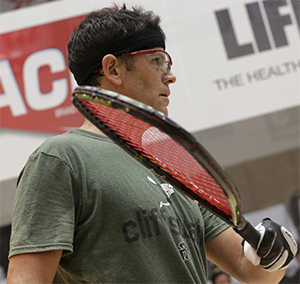|
|

A Different Kind of Power?
By Steve Crandall
Vice President, Sales & Marketing
Ashaway Racket Strings

Cliff Swain was a dedicated PowerKill user until he tried Ashaway's new PU based MultiKill 17. Now, he's switched. He's still a PowerKill fan, but loves the 'effortless' power, durability and feel he gets from the MultiKill. "At first, I thought switching would be a hard decision," he said, "but really, I can't go wrong either way."
|
We've done a number of columns now on Polyurethane (PU) based strings. We've talked about their market share, how they're made, and what physical properties they offer. We've compared them with Zyex® (PEEK) based strings and nylon strings. We've even reported on feedback from playtesters. So, frankly, we were ready to move on to other scintillating string topics. But then, at the end of the last column, Cliff Swain said this: "There is something about the polyurethane, nylon filament combination that also gives me excellent power. But it's power of a different sort."
A different kind of power? That was not what we had expected. It came out of the blue, like someone complimenting us on our table manners. So, of course, we had to follow it up.
First we went back to Cliff and asked if he could expand on his original comment. "It's hard to describe because the PowerKill® is so powerful," Cliff said, but with the MultiKill® 17, "it's like a sling shot off of the frame. The ball takes off faster: just a little more power with a little less effort. I'd even say it has a little more feel up front, too."
We then talked to Ian Titus of Lawler Sports, the US Open stringer for many years. He agreed there is a definite difference in the response of PU based string, and speculated it was because the PU is softer. "That's where you get the power," he said. The Zyex is more dynamic, that's where you get that pop."
Now it's an old rule of thumb that a string will provide more power at lower tension than at high: if it feels softer, in other words. But what Ian was getting at was the notion of dwell time. Because PU based strings like MultiKill 17 are softer, the ball stays on the strings just a little bit longer. We're talking milliseconds here, but this allows the racquet to use leverage to generate power, like a lacrosse stick. You feel like you are really whipping the ball off the racquet, as opposed to Zyex based strings where you get that crisp feeling of the ball rebounding off the string bed really fast.
But Ian is also suspicious about the nature of that leveraged power. "I think it just tricks the mind into thinking this is more powerful than Zyex," he said. "I'll bet if you hit a hundred backhands or forehands with each string and clocked them, I don't think you'd be getting anything more out of the PU than the Zyex. But I just think the feel of it is so much softer, that it tricks people into thinking they're getting more power, or that they are hitting really well."
He sees this as one of the real benefits of MultiKill 17 type PU strings: "I find that the softer strings really benefit people just getting into the game. It helps subdue arm issues from poor technique at the start, while they are still learning. When I've gotten guys who are just getting into the sport, I will put them into a string like a MultiKill before a Zyex string. As they get better and better, once they get really competitive into the B and A levels, then I think people really want that crisp response."
"My take on it," Ian continued, "is with better players, their swing speed is high and they're hitting correctly, right in the sweet spot with proper technique. They tend to prefer the Zyex based PowerKill or UltraKill® string because that's where they get that crisp power and precise control. They don't need a softer string. This is not to say MultiKill is not used in the upper levels, or vice versa, but I find that B level players, and down, love that MultiKill feel and they think they're getting more power, but really it's just softer. The softer string protects the arm and tricks them into thinking that they are not mishitting as much. With MultiKill, you can get a little farther out of the sweet spot and not really feel it on your arm. With UltraKill, if you get out of the sweet spot and start racking up those hits on the edge, you're going to feel it, and you're probably going to snap the string."
Now no one would accuse Cliff Swain of being a B level player, but he likes MultiKill 17 so much that he switched. "I did switch," he said. "I still like using the PowerKill and once in a while I pick it up and I still love it. At first, I thought switching would be a hard decision, but really, I can't go wrong either way.
"I'm also impressed with its durability," he added. "It plays like an 18 gauge string but has 16 gauge durability. And the effortless power of the MultiKill 17 is incredible. I want people to use it because I really feel it helps make their game better: especially anybody who has elbow or shoulder problems. It can really help that because it's easier on the body but with more power at the same time."
So a different kind of "effortless" power, or just a more forgiving way to up your game? You be the judge. But let us know what you think.
ZYEX® is a registered trademark of Victrex Ltd.
|